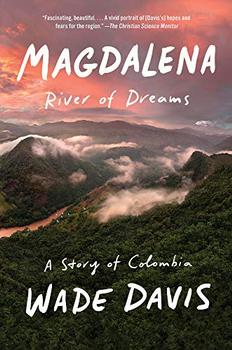Summary | Excerpt | Reviews | Beyond the Book | Readalikes | Genres & Themes | Author Bio

River of Dreams: A Story of Colombia
by Wade DavisExcerpt
Magdalena
Colombia is said to be the land of a thousand rhythms. Ethnomusicologists have in fact identified 1025.
Cumbia is a rhythm, a beat, a dance—a choreography of seduction that ignites the spirit and shakes the soul, infusing one's entire physical being with a sensual promise as innocent and perfect as a prayer. The dance movements of the male recall the desires of the lone cimarrón: passionate, powerful, yearning. Those of the woman, the coy resistance of the native maiden, bright candles in hand, spinning in a whirlwind of indifference. The music builds through the night, an alchemy of spirit and sensation that with every performance enhances its authority and power, laying claim to its rightful place as the progenitor of all musical forms in a nation nursed on rhythm, inspired from birth by song.
A scholar who truly understands the essence and roots of Cumbia is Carlos Vives, Colombia's beloved musical icon, an international star who arguably has done more to popularize the traditional genre than any living artist. Carlos is a child of Santa Marta, a product of the sun and the sea. The city lies in the shadow of the Sierra Nevada de Santa Marta, homeland of the Arhuaco, Wiwa, and Kogi, whose children Carlos played with as a boy. He grew up in the presence of multiple cultural realities, at ease in a town that never rests. Music was the backdrop of his youth, a cacophony of sound that greeted every dawn and heralded each night the growing radiance of the stars. Along the waterfront and in the neighborhoods, in hidden doorways and brightly lit bars, he absorbed the rhythms of an ever- changing and expanding repertoire of musical forms, each the out- come of a new passion—a fusion of unexpected and unanticipated possibilities, envisioned by men and women who were themselves the products of a melding of blood and culture so complete that to this day fully 85 percent of Colombians in a recent national census describe themselves as having no particular ethnic origins.
Carlos began his career as an actor, playing the lead in a series based on the life of Rafael Escalona, the father of vallenato, a musical genre that, as the word implies, was "born in the valley," along the dry riverbeds and dusty draws reaching north and south of Valledupar and the headwaters of the Río Cesar on the far side of the Sierra Nevada. As a boy, Carlos became enchanted by the sound: the plaintive notes of the accordion, the beat laid down by the caja drum of Africa, the rhythm of the guacharaca, an instrument clearly of indigenous origins. He was equally moved by the spirit of the songs, each a story of nature, freedom, and love; the birth of a child, a wedding gone wrong, the mysterious flight of a magical bird, the delicate movements of deer in the evening as the sun softens on the horizon.
As an actor, Carlos covered Escalona's songs much as the composer intended them to be sung. But as a musician with a passion for his country and a heart as expansive and all-embracing as the land he so clearly loves, Carlos in time completely reinterpreted the genre, fusing traditional vallenato with rock and pop and other Caribbean sounds in a manner that scandalized purists but electrified the world. Beginning in 1993 with Clásicos de la Provincia, Carlos and his band produced a string of massive international hit albums recognized today as timeless classics, with songs that in Colombia's darkest days served as antidotes to despair, even as they distilled all that was decent and good in the country. Songs that told the truth. Anthems of joy and redemption. Melodies of loss. A musical repertoire of love and belonging rooted in a spirit of place that perhaps only a Colombian can fully understand, one who has suffered, which today implies nearly everyone in the country.
Excerpted from Magdalena by Wade Davis. Copyright © 2020 by Wade Davis. Excerpted by permission of Knopf. All rights reserved. No part of this excerpt may be reproduced or reprinted without permission in writing from the publisher.
Only when we are no longer afraid do we begin to live
Click Here to find out who said this, as well as discovering other famous literary quotes!
Your guide toexceptional books
BookBrowse seeks out and recommends the best in contemporary fiction and nonfiction—books that not only engage and entertain but also deepen our understanding of ourselves and the world around us.